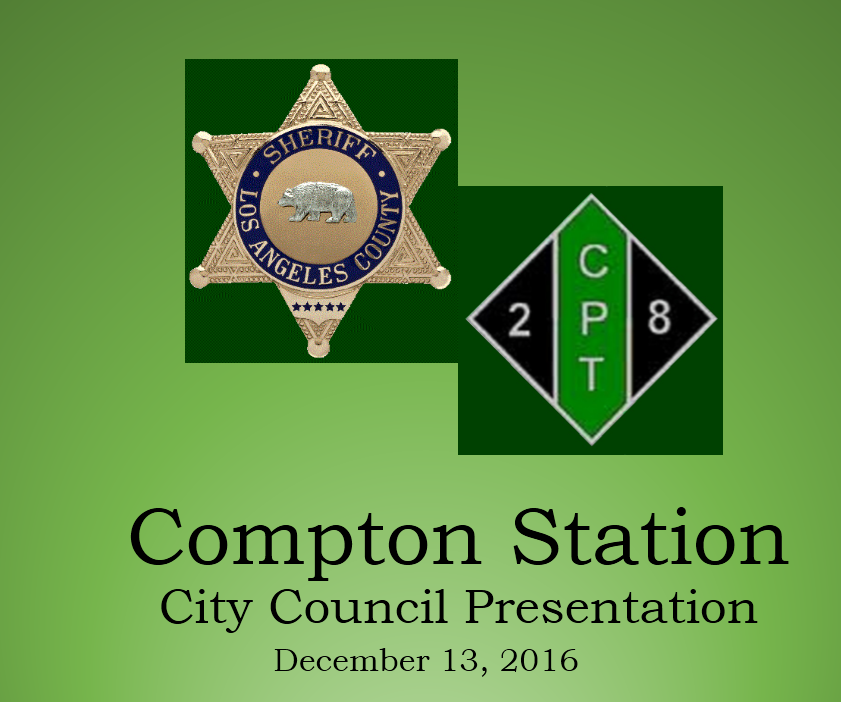
They also need to propose a policy about public notification of these types of experiments in the future. Given the numerous scandals and controversies that have plagued the Sheriff’s Department and the loud call for reform within the institution, the sheriff candidates need to express to the public their position on mass surveillance. Of those seven, at least three - Baca’s former undersheriff, Paul Tanaka, and assistant sheriffs Todd Rogers and Jim Hellmold - possibly knew about the surveillance and said nothing. But anyone opposed to secret (or not-so-secret) mass surveillance of the public, should take concerns about the Compton experiment to the seven men running to replace Baca as Sheriff. And it’s highly doubtful either man would come forth to explain his role in the experiment. Perhaps nothing can be done to hold either of them accountable. The discussions around this experiment began in 2011 under Lee Baca, who was then sheriff, and Eric Perrodin, who was then Compton’s mayor and a Los Angeles County assistant district attorney. Watch a video created by the Center for Investigative Reporting about the Compton surveillance program and other high-tech crime-fighting operations around the country: It makes you wonder what else the Sheriff’s Department has kept “hush hush” from the public to “mitigate complaints.” It’s highly unlikely that this type of experiment would have gone unchecked in Rancho Palos Verdes, Rolling Hills, Malibu or any of the other more affluent areas under the sheriff’s watch. And they are not the only Americans who find mass surveillance creepy.Ĭompton was just a city that the Sheriff’s Department felt was the least likely to mount organized resistance to the department’s experiment. The attitude seemed to be, “If they don’t know, they can’t complain.” It is inconceivable that the LASD would allow a sergeant to be quoted by any news organization saying something along the lines of: Yeah, we did it, and we didn’t tell residents because you know how people get about this kind of stuff.Ĭompton residents are not guinea pigs. “This system was kind of kept confidential from everybody in the public,” he said. “A lot of people do have a problem with the eye in the sky, the Big Brother, so to mitigate those kinds of complaints we basically kept it pretty hush hush.” Meanwhile, the Sheriff’s Department’s Sergeant Douglas Iketani openly acknowledged that his agency hid the experiment to avoid public opposition during an interview with the Bay Area-based Center for Investigative Reporting. This is the same agency that took extraordinary measures to avoid FBI surveillance during a federal investigation into inmate abuse and corruption. Ironic. It doesn’t matter that the department has since nixed the program because it was deemed not useful for fighting crime. The fact that the LASD conducted the experiment seemingly without notifying anyone outside the department highlights the ongoing misconduct in the troubled law enforcement agency.


Compton’s taxpayers foot the bill for the LASD in their city, and law enforcement shouldn’t forget that or take it for granted. So for me, the problems with the Los Angeles County Sheriff’s Department’s secret mass surveillance experiment conducted on the residents of Compton in 2012 have less to do with the actual experiment than with the cloud of secrecy around it – especially the decision not to inform the public in order to avoid complaints or public outrage.

I resigned myself a long time ago to the idea that even in my bed in the dead of night, somebody could be watching. I realize that when I check in on Facebook, drive my car or use my cellphone, I am practically inviting those “powers” to do so.

I am not oblivious to the fact that I can be watched and tracked by the powers that be. A neon sign for the LA County Sheriff’s Department |


 0 kommentar(er)
0 kommentar(er)
